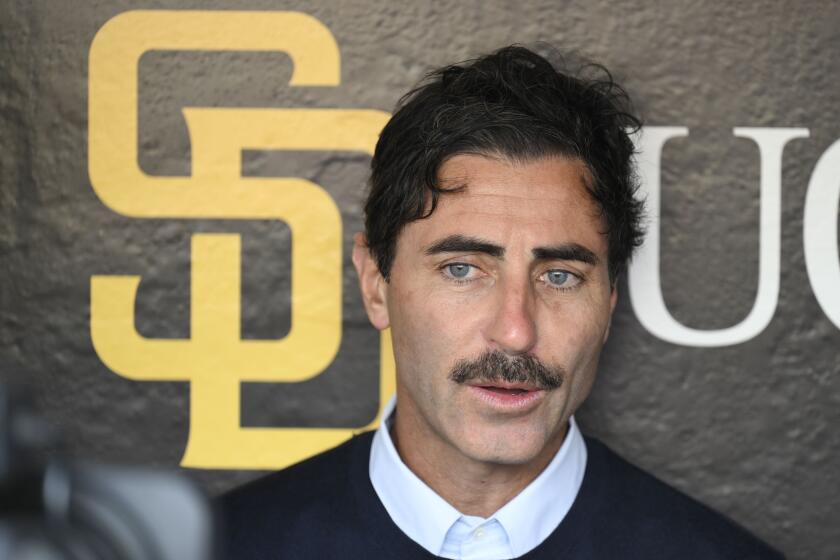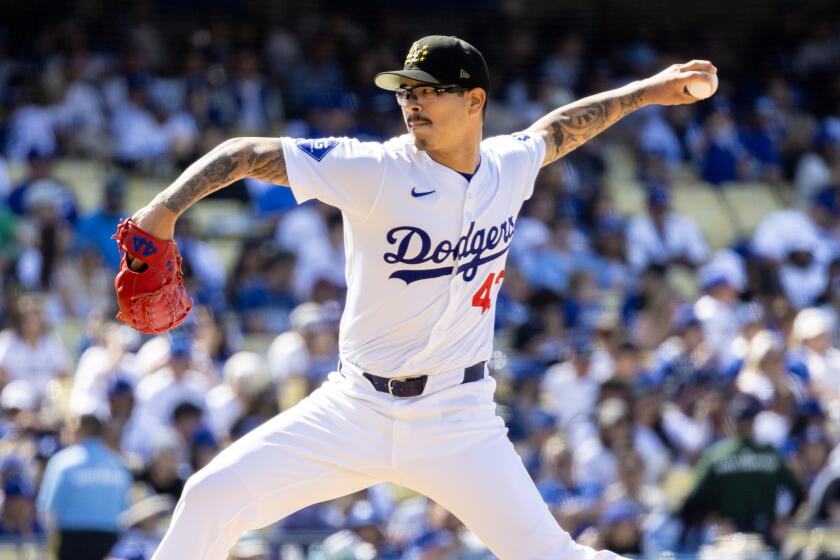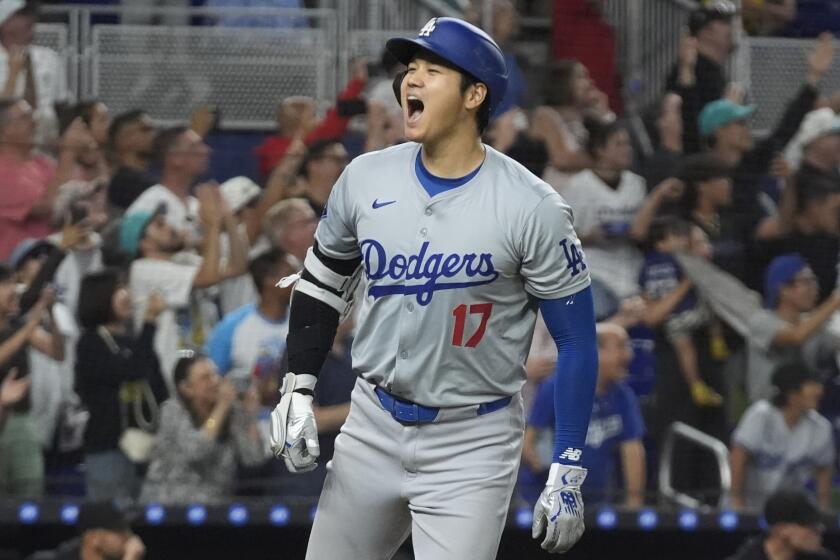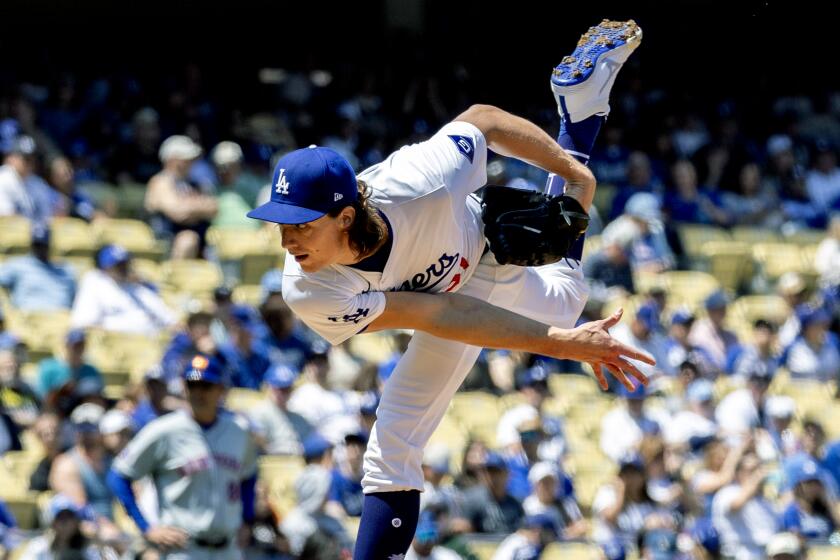Going to School : Managing at Albuquerque, Russell Is Learning Things He Couldn’t Learn From Lasorda in Dugout With Dodgers
It is the only piece of artwork on the walls of Bill Russell’s tiny office, which is otherwise dominated by a 30-year-old flowered couch that could collapse at any minute.
The painting is of a cowboy with gaunt, grizzled cheeks and a hardened stare.
Underneath him is this sentence: “There was a helluva lot of things they didn’t tell me when I hired on with this outfit.”
After his first six weeks as manager of the triple-A Albuquerque Dukes, Russell has memorized those words.
Any day now, he is going to start looking like that cowboy.
“I usually call my managers after we’ve lost, so I’ve called Bill a lot,” explained Pat McKernan, Duke general manager. “I said, ‘You OK?’ He says, ‘Yeah.’
“Then I say, ‘It’s interesting here, isn’t it?’ ”
Interesting? Russell would give half his salary for one night of “interesting.”
In his short time here as the Dodgers’ manager-in-waiting, he has been faced with the bizarre, volatile, embarrassing and upsetting.
--A six-game losing streak that caused him to climb out of bed in the middle of the night with a churning stomach.
--A bench-clearing incident with another team, and a near brawl between two of his own players.
--A demotion of two of the organization’s top pitching prospects, causing one to punch a locker and bloody his knuckles.
--A media corps that consists of a female reporter who was “flashed” by one of his players.
Russell realized his life would never again be merely “interesting” one night when he encountered a very drunk stranger walking through his clubhouse eating the postgame chicken.
As the man was being thrown out, he grabbed a piece of chicken with one hand and gave Russell an obscene gesture with the other.
“Once the game starts, that’s the easy part,” Russell said.
But, according to players and officials, he’s making it all look like the easy part.
During perhaps the most difficult six weeks of his life, Russell is beginning to prove to the Dodgers that when Tom Lasorda retires, they won’t have to look far to replace him.
“In a short time he has already been through a lot, but he has handled it very well,” said Fred Claire, Dodger vice president. “Faced with disappointment, he is showing the same patience and reluctance to give up that he showed as a player.”
Although Russell’s young and often overmatched team had a record of 19-21, he had yet to publicly lose his temper with a player, umpire or member of the media. He rarely even raises his voice.
Yet his clubhouse meetings cause chills and his closed-door meetings bring dread.
“(When) his face and neck get red, he’s mad,” pitcher Brian Holton said. “He’ll never rip anybody publicly, but he doesn’t need to. By now, we know.”
His players are openly thankful that he treats them as professionals and allows them to be themselves. On his insistence, they are even receiving gift certificates for doing pregame radio shows for the first time.
Yet he has virtually rewritten lax clubhouse rules and levied more than 30 fines for breaking them.
“A lot of these young guys were doing stupid things--like not being on time or not shagging balls--and he let them know right away that he wasn’t going to take it,” pitcher Kip Gross said. “He tells everybody that we are just one step from the major leagues, and so we’re going to act like major leaguers.”
Holton agreed with Russell that, for his new manager, the game is the easy part.
“A couple of managers in this league end up with their hands tied in the late innings, but not Billy,” he said. “He is two innings ahead of everyone else. You don’t hear anybody complaining about his strategy.”
Playing in a veteran triple-A league with an opening-day roster with 13 players who were age 24 or under, Russell is attempting to mold the team in his image: Hard-working, thoughtful, no bull--and no sunglasses.
One of the first things Russell did was refuse to let players wear those wraparound glasses that have become so popular.
“A lot of times those glasses just get in the way,” Russell said. “It’s not the way I was brought up in this game.”
At the end of spring training earlier this year, however, Russell could have used dark glasses to hide his emotions. It was the first time since 1969 that he had not accompanied the Dodgers to Los Angeles from Vero Beach as either a player or coach.
While waving goodby to Lasorda and others, Russell had tears.
“I must admit, I had very mixed feelings,” Russell said. “And I still miss Los Angeles. I miss the atmosphere, I miss Tommy and the coaches.”
He paused and added: “But, I have a job to do here. And I will do it.”
The job was offered to him last October after Albuquerque Manager Kevin Kennedy fell out of favor with the organization.
Few coaches would dare set foot outside a major league clubhouse for the minor leagues, even if it involved becoming a manager for the first time.
But with the offer came an unspoken pledge.
If Russell could prove himself on the triple-A level, he would be the top candidate to replace Lasorda when he retires within the next couple of years.
“It was time that I prove myself, either to the Dodgers or somebody else,” said Russell, 43, who turned down the Albuquerque job after the 1988 season.
He is learning the hard way that taking it was the right one move.
“Before, I thought I could manage in the big leagues just from the experience of coaching under Tommy,” he said. “But now I know, I have really needed this.”
His wife, Mary Anne, must have had a premonition when she insisted they buy the cowboy painting from a roadside vendor while driving to Albuquerque last winter from their Tulsa-area home.
“Sure, we were a little scared. We had a little fear of the unknown,” said Mary Anne, who also has been forced to adjust.
During a recent game at the Sports Stadium, she sat behind home plate, listening to the game on the radio and writing in her scorebook. Rows in front of her and behind her were empty. Nearby was a blanket, for the late innings.
Around her, several hundred fans stared intently at the field while several thousand Boy Scouts and Cub Scouts chase foul balls.
Female ushers were calling everyone, “Hon.” Hot dogs were sold with mustard already on them.
Russell stalked the dugout with his hands tucked into his pants like Lasorda, leaned against the bat rack like Lasorda, muttered to himself like Lasorda.
“I can see certain things where he is like Tommy,” Holton said. “But in other things, he is very different.”
He is more like, perhaps, Walt Alston. Or for a current reference, the Minnesota Twins’ Tom Kelly.
“I was with Walter at a very young age, so I think I may get my personality from him,” Russell said. “But running the game, I get that from Tommy (Lasorda).”
Things began getting serious for the Dukes the moment Russell walked into the clubhouse opening night. He discovered players skipping batting practice by hiding in the trainer’s room and weight room.
It doesn’t happen anymore. Russell even added a pregame stretching session, forcing the players onto the field earlier.
“These are basic, major league things, and I’m trying to run this like a major league team,” Russell said. “It’s the only way I can help these kids.”
He saw a player jogging in the outfield during batting practice with a sock tied around his head. He sent out a batboy with the players’ cap.
He called another top prospect into his office after his dugout advice was being met with smart answers.
“I told him, ‘Nobody likes a know-it-all,’ ” Russell said. “I told him, ‘You don’t like it, fine, you don’t have to like it. But I’m the manager, I’m the boss. And you will listen.’ ”
Russell added: “He didn’t talk to me for a couple of days, but now we have an understanding.”
When he is finished with his form of discipline, he lets his veterans take over.
Holton and top pitching prospect Pedro Martinez recently engaged in a shouting match in the outfield. According to several players, Martinez was acting lazy while shagging balls, and Holton spoke up.
“Billy let it go for a little bit, then came out and broke it up,” Holton said. “I think that was important, because sometimes it takes a veteran to get through to a younger player. Billy knows that.”
Russell’s younger players also have bothered him with repeated baserunning blunders and throws to the wrong base.
During clubhouse meetings, Russell warned that those who are not concentrating will be replaced. And he has been true to his word.
Albuquerque has undergone as much turnover in six weeks as it has during some full seasons. The Dukes have demoted four players and released another.
“Some of these kids have ‘major league-itis,’ and Billy has had to set them straight,” said Mickey Hatcher, Russell’s third base coach. “We had one top pitcher who wasn’t pitching, but (was) kicking the mound and acting like a baby.
“Billy tells everyone, if you’re not doing the job here, I’ll get somebody else to do it. And he does.”
Said Russell: “The talent is there. I just want to get them to start thinking.”
Russell said giving players bad news has been one of the hardest parts of his job, but it is the part in which he has shown the most compassion.
After informing two players of their demotions recently, he walked outside his office to discover that one of them punched a locker and cut his hand.
Russell met with him again and consoled him further.
“I’ve watched Tommy send a lot of players down, but until you do it yourself, you have no idea how hard it is,” Russell said.
Russell has impressed Barbara Chavez of the Albuquerque Journal, the only reporter to regularly cover the team.
“I thought he would be harder to deal with because he had just spent all those years in the major leagues,” Chavez said of Russell, who disciplined the player who “flashed” her. “But he’s been very pleasant. And when things are going bad, he tells you they are going bad.”
Life is even more different on the road, where none of the jets are chartered and every wake-up call is too early.
Russell recently experienced a first when he managed a game without having slept the night before.
That morning his team left Tacoma, Wash., at 4 a.m. after a night game, driven to the Seattle airport, flown to Albuquerque via Salt Lake City and arrived at home at 11 a.m.
“Once the game started, my adrenaline took over,” Russell said. “But it’s good for me. I’m learning about all different sides of managing.”
The losing hurts.
Russell is not used to it. He wonders if he ever will be used to it.
After several losses earlier in the year, Mary Anne Russell remembers hearing noises in their apartment in the middle of the night.
It was her husband, watching television, reading the newspaper, doing anything to forget about the pain in his stomach.
“Sometimes I think, ‘Is it supposed to feel like this?’ ” he said. “ ‘Am I supposed to hurt this bad?’ ”
After six weeks, Russell has decided that it is supposed to hurt. He has decided that managing is supposed to tug hard at your heart and your temper. If it doesn’t, then it is not worth it.
“I’ve learned this much--I can become a manager,” he said. “And when somebody needs me, hopefully the Dodgers, I can be ready.”
Are you a true-blue fan?
Get our Dodgers Dugout newsletter for insights, news and much more.
You may occasionally receive promotional content from the Los Angeles Times.








